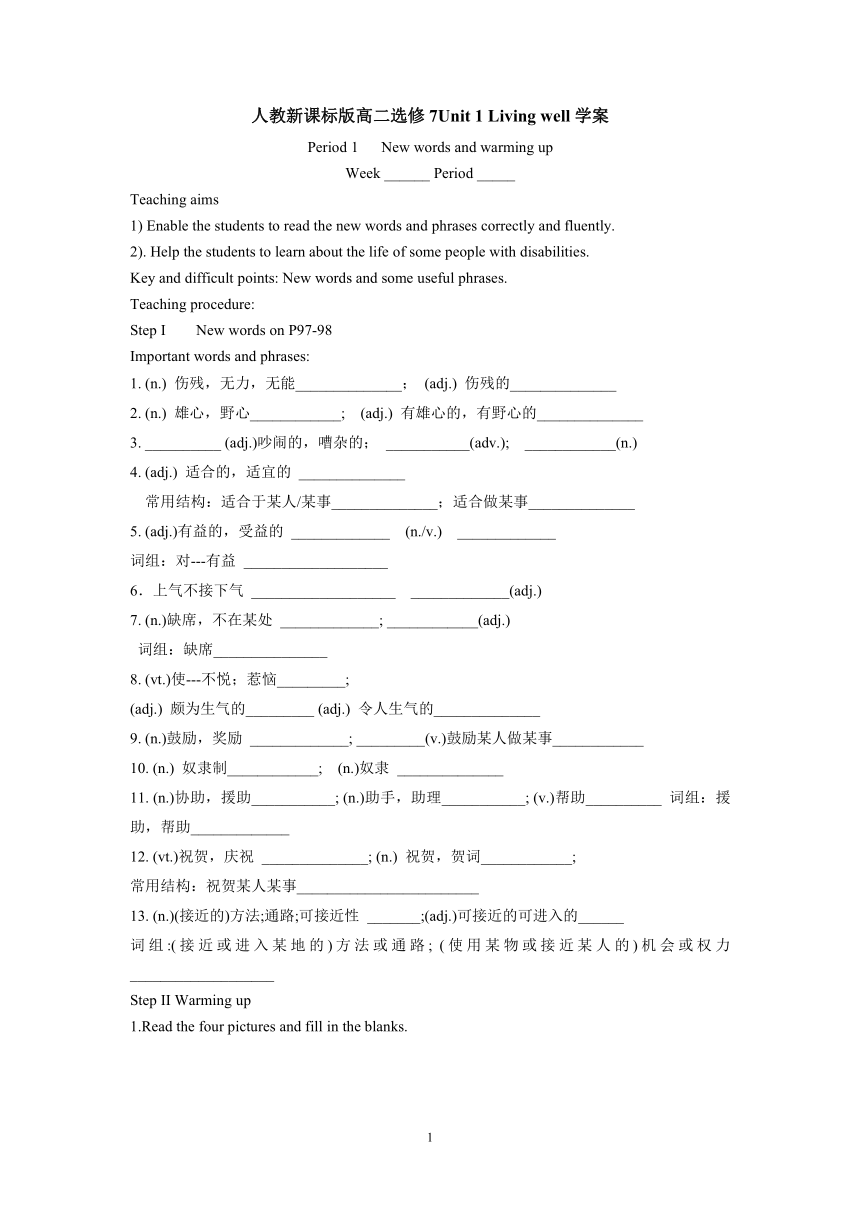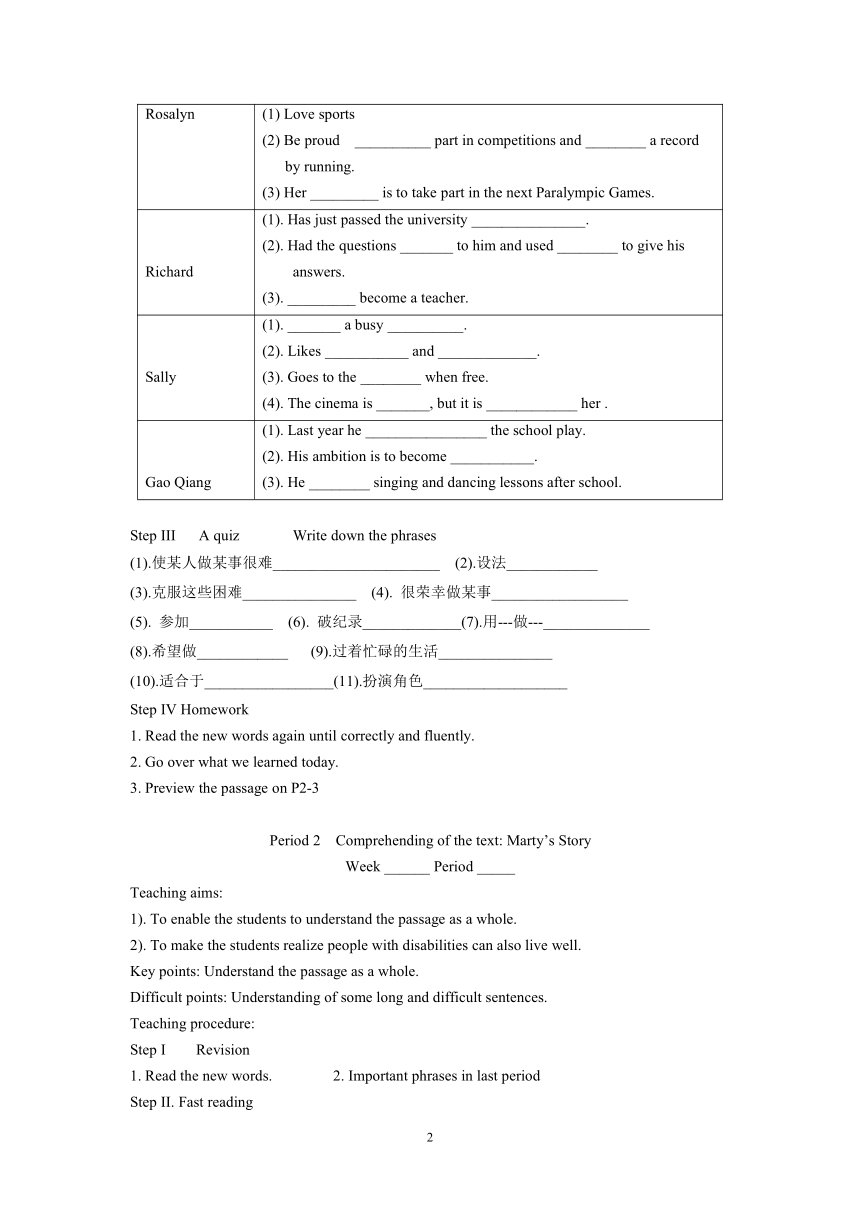人教新课标版高二选修7Unit 1 Living well学案
文档属性
| 名称 | 人教新课标版高二选修7Unit 1 Living well学案 |  | |
| 格式 | zip | ||
| 文件大小 | 11.2KB | ||
| 资源类型 | 教案 | ||
| 版本资源 | 人教版(新课程标准) | ||
| 科目 | 英语 | ||
| 更新时间 | 2012-03-01 10:03:16 | ||
图片预览


文档简介
人教新课标版高二选修7Unit 1 Living well学案
Period 1 New words and warming up
Week ______ Period _____
Teaching aims
1) Enable the students to read the new words and phrases correctly and fluently.
2). Help the students to learn about the life of some people with disabilities.
Key and difficult points: New words and some useful phrases.
Teaching procedure:
Step I New words on P97-98
Important words and phrases:
1. (n.) 伤残,无力,无能______________; (adj.) 伤残的______________
2. (n.) 雄心,野心____________; (adj.) 有雄心的,有野心的______________
3. __________ (adj.)吵闹的,嘈杂的; ___________(adv.); ____________(n.)
4. (adj.) 适合的,适宜的 ______________
常用结构:适合于某人/某事______________;适合做某事______________
5. (adj.)有益的,受益的 _____________ (n./v.) _____________
词组:对---有益 ___________________
6.上气不接下气 ___________________ _____________(adj.)
7. (n.)缺席,不在某处 _____________; ____________(adj.)
词组:缺席_______________
8. (vt.)使---不悦;惹恼_________;
(adj.) 颇为生气的_________ (adj.) 令人生气的______________
9. (n.)鼓励,奖励 _____________; _________(v.)鼓励某人做某事____________
10. (n.) 奴隶制____________; (n.)奴隶 ______________
11. (n.)协助,援助___________; (n.)助手,助理___________; (v.)帮助__________ 词组:援助,帮助_____________
12. (vt.)祝贺,庆祝 ______________; (n.) 祝贺,贺词____________;
常用结构:祝贺某人某事________________________
13. (n.)(接近的)方法;通路;可接近性 _______;(adj.)可接近的可进入的______
词组:(接近或进入某地的)方法或通路; (使用某物或接近某人的)机会或权力___________________
Step II Warming up
1.Read the four pictures and fill in the blanks.
Rosalyn (1) Love sports(2) Be proud __________ part in competitions and ________ a record by running.(3) Her _________ is to take part in the next Paralympic Games.
Richard (1). Has just passed the university _______________.(2). Had the questions _______ to him and used ________ to give his answers.(3). _________ become a teacher.
Sally (1). _______ a busy __________.(2). Likes ___________ and _____________.(3). Goes to the ________ when free.(4). The cinema is _______, but it is ____________ her .
Gao Qiang (1). Last year he ________________ the school play.(2). His ambition is to become ___________.(3). He ________ singing and dancing lessons after school.
Step III A quiz Write down the phrases
(1).使某人做某事很难______________________ (2).设法____________
(3).克服这些困难_______________ (4). 很荣幸做某事__________________
(5). 参加___________ (6). 破纪录_____________(7).用---做---______________
(8).希望做____________ (9).过着忙碌的生活_______________
(10).适合于_________________(11).扮演角色___________________
Step IV Homework
1. Read the new words again until correctly and fluently.
2. Go over what we learned today.
3. Preview the passage on P2-3
Period 2 Comprehending of the text: Marty’s Story
Week ______ Period _____
Teaching aims:
1). To enable the students to understand the passage as a whole.
2). To make the students realize people with disabilities can also live well.
Key points: Understand the passage as a whole.
Difficult points: Understanding of some long and difficult sentences.
Teaching procedure:
Step I Revision
1. Read the new words. 2. Important phrases in last period
Step II. Fast reading
1. Read the text quickly and choose the right answers.
(1). Marty is ____ person.
A. a healthy B. an ill C. a disabled D. a rich
(2). Marty has ____disease.
A. a mental B. a muscle C. an eye D. a leg
(3). What’s Marty’s dream
A. Being a doctor.
B. Being a famous football player and representing his country in the World Cup.
C. Being a college student.
D. Being a basketball player.
2. Read the text again and judge whether the sentences are TRUE or False.
(1).The doctors know the real reason of my disease. ( )
(2). I started to have this disease at the age of ten. ( )
(3). All of my fellows have begun to accept me when I’m at high school, so my life is a lot easier than before. ( )
(4). Now I have a very busy life and get a lot of enjoyment. ( )
Step III Detailed reading
1. Read carefully again and answer the questions:
(1). Why did the doctors cut out a piece of muscle from Marty’s leg
Because they could cure the disease by cutting it out.
Because they wanted to use it as a specimen(标本).
Because they would transplant(移植) the new muscle.
Because they wanted to find out the cause of the disease.
(2). Which of the following is TRUE according to the text
A. While at high school, not all Marty’s classmates accept him.
B. A big company bought the computer game from Marty.
C. The doctors know Marty’s disease well but they hide the truth.
D. Marty looks quite different from other because of his disease.
(3). Which of the following is false
Although there are a few students who look down upon him, Marty never gets annoyed.
B. Marty leads a meaningful life and does not feel sorry for being disabled.
C. Marty only spends time with his pets and never with his friends.
D. Marty disability has made him more independent.
(4). According to Marty’s opinion, what should we do to the disabled
A. Don’t feel sorry for them
B. Don’t make fun of them
C. Don’t ignore them
D. Accept them for who they are
E. Encourage them to live as rich and full a life as you do
2. Fill in the following form
Marty’s mini biography (传记)
His disease A ___________ disease
His symptoms ___________, __________ and tired
His ambition To ____________________
His achievement Invented __________________
His hobby Watching _________ and football_________, looking after _____________.
His motto
His advice (1). Don’t ____________ for them. (2). Don’t _______________ them (3). Don’t _________ them,(4)._________ them for who they are(5). ___________ them to live as we do
Step IV. Main idea
1. The summary of the first five paragraphs.
Paragraph 1 _____ Paragraph 2 _____ Paragraph 3 _____ Paragraph 4 _____ Paragraph 5 _____
A. Marty met a lot of difficulties at school.
B. How his disability developed.
C. The advantages of his disease.
D. An introduction to Marty and his muscle disease
E. How his life has become easier.
2. What’s the main idea of the text
Though he is a ________ person, Marty never feels sorry for himself and he enjoys his life.
Step V. A quiz
1.换句话说_______________ 2.此外,另外_______________
3.撞上_______________ 4.学会做_______________
5.适合_______________ 6.一次_______________
7.过去常常_______________ 8.梦想,向往_______________
9.切去,省略,停止做_______________ 10.至少_______________
11.看上去与---不同_______________ 12.上气不接下气_______________
13.每当_______________ 14.总而言之_______________
15.为---效力_______________ 16.决定_______________
17.闲坐着_______________ 18.同情_______________
19.和,也_______________ 20.在很多方面_______________
21.过着---样的生活_______________ 22.有机会做_______________
23.取笑_______________
Step VI Homework
1. Read the new words again.
2. Go over what we learned today.
3. Read the notes on P86-87.
PAGE
1
Period 1 New words and warming up
Week ______ Period _____
Teaching aims
1) Enable the students to read the new words and phrases correctly and fluently.
2). Help the students to learn about the life of some people with disabilities.
Key and difficult points: New words and some useful phrases.
Teaching procedure:
Step I New words on P97-98
Important words and phrases:
1. (n.) 伤残,无力,无能______________; (adj.) 伤残的______________
2. (n.) 雄心,野心____________; (adj.) 有雄心的,有野心的______________
3. __________ (adj.)吵闹的,嘈杂的; ___________(adv.); ____________(n.)
4. (adj.) 适合的,适宜的 ______________
常用结构:适合于某人/某事______________;适合做某事______________
5. (adj.)有益的,受益的 _____________ (n./v.) _____________
词组:对---有益 ___________________
6.上气不接下气 ___________________ _____________(adj.)
7. (n.)缺席,不在某处 _____________; ____________(adj.)
词组:缺席_______________
8. (vt.)使---不悦;惹恼_________;
(adj.) 颇为生气的_________ (adj.) 令人生气的______________
9. (n.)鼓励,奖励 _____________; _________(v.)鼓励某人做某事____________
10. (n.) 奴隶制____________; (n.)奴隶 ______________
11. (n.)协助,援助___________; (n.)助手,助理___________; (v.)帮助__________ 词组:援助,帮助_____________
12. (vt.)祝贺,庆祝 ______________; (n.) 祝贺,贺词____________;
常用结构:祝贺某人某事________________________
13. (n.)(接近的)方法;通路;可接近性 _______;(adj.)可接近的可进入的______
词组:(接近或进入某地的)方法或通路; (使用某物或接近某人的)机会或权力___________________
Step II Warming up
1.Read the four pictures and fill in the blanks.
Rosalyn (1) Love sports(2) Be proud __________ part in competitions and ________ a record by running.(3) Her _________ is to take part in the next Paralympic Games.
Richard (1). Has just passed the university _______________.(2). Had the questions _______ to him and used ________ to give his answers.(3). _________ become a teacher.
Sally (1). _______ a busy __________.(2). Likes ___________ and _____________.(3). Goes to the ________ when free.(4). The cinema is _______, but it is ____________ her .
Gao Qiang (1). Last year he ________________ the school play.(2). His ambition is to become ___________.(3). He ________ singing and dancing lessons after school.
Step III A quiz Write down the phrases
(1).使某人做某事很难______________________ (2).设法____________
(3).克服这些困难_______________ (4). 很荣幸做某事__________________
(5). 参加___________ (6). 破纪录_____________(7).用---做---______________
(8).希望做____________ (9).过着忙碌的生活_______________
(10).适合于_________________(11).扮演角色___________________
Step IV Homework
1. Read the new words again until correctly and fluently.
2. Go over what we learned today.
3. Preview the passage on P2-3
Period 2 Comprehending of the text: Marty’s Story
Week ______ Period _____
Teaching aims:
1). To enable the students to understand the passage as a whole.
2). To make the students realize people with disabilities can also live well.
Key points: Understand the passage as a whole.
Difficult points: Understanding of some long and difficult sentences.
Teaching procedure:
Step I Revision
1. Read the new words. 2. Important phrases in last period
Step II. Fast reading
1. Read the text quickly and choose the right answers.
(1). Marty is ____ person.
A. a healthy B. an ill C. a disabled D. a rich
(2). Marty has ____disease.
A. a mental B. a muscle C. an eye D. a leg
(3). What’s Marty’s dream
A. Being a doctor.
B. Being a famous football player and representing his country in the World Cup.
C. Being a college student.
D. Being a basketball player.
2. Read the text again and judge whether the sentences are TRUE or False.
(1).The doctors know the real reason of my disease. ( )
(2). I started to have this disease at the age of ten. ( )
(3). All of my fellows have begun to accept me when I’m at high school, so my life is a lot easier than before. ( )
(4). Now I have a very busy life and get a lot of enjoyment. ( )
Step III Detailed reading
1. Read carefully again and answer the questions:
(1). Why did the doctors cut out a piece of muscle from Marty’s leg
Because they could cure the disease by cutting it out.
Because they wanted to use it as a specimen(标本).
Because they would transplant(移植) the new muscle.
Because they wanted to find out the cause of the disease.
(2). Which of the following is TRUE according to the text
A. While at high school, not all Marty’s classmates accept him.
B. A big company bought the computer game from Marty.
C. The doctors know Marty’s disease well but they hide the truth.
D. Marty looks quite different from other because of his disease.
(3). Which of the following is false
Although there are a few students who look down upon him, Marty never gets annoyed.
B. Marty leads a meaningful life and does not feel sorry for being disabled.
C. Marty only spends time with his pets and never with his friends.
D. Marty disability has made him more independent.
(4). According to Marty’s opinion, what should we do to the disabled
A. Don’t feel sorry for them
B. Don’t make fun of them
C. Don’t ignore them
D. Accept them for who they are
E. Encourage them to live as rich and full a life as you do
2. Fill in the following form
Marty’s mini biography (传记)
His disease A ___________ disease
His symptoms ___________, __________ and tired
His ambition To ____________________
His achievement Invented __________________
His hobby Watching _________ and football_________, looking after _____________.
His motto
His advice (1). Don’t ____________ for them. (2). Don’t _______________ them (3). Don’t _________ them,(4)._________ them for who they are(5). ___________ them to live as we do
Step IV. Main idea
1. The summary of the first five paragraphs.
Paragraph 1 _____ Paragraph 2 _____ Paragraph 3 _____ Paragraph 4 _____ Paragraph 5 _____
A. Marty met a lot of difficulties at school.
B. How his disability developed.
C. The advantages of his disease.
D. An introduction to Marty and his muscle disease
E. How his life has become easier.
2. What’s the main idea of the text
Though he is a ________ person, Marty never feels sorry for himself and he enjoys his life.
Step V. A quiz
1.换句话说_______________ 2.此外,另外_______________
3.撞上_______________ 4.学会做_______________
5.适合_______________ 6.一次_______________
7.过去常常_______________ 8.梦想,向往_______________
9.切去,省略,停止做_______________ 10.至少_______________
11.看上去与---不同_______________ 12.上气不接下气_______________
13.每当_______________ 14.总而言之_______________
15.为---效力_______________ 16.决定_______________
17.闲坐着_______________ 18.同情_______________
19.和,也_______________ 20.在很多方面_______________
21.过着---样的生活_______________ 22.有机会做_______________
23.取笑_______________
Step VI Homework
1. Read the new words again.
2. Go over what we learned today.
3. Read the notes on P86-87.
PAGE
1
